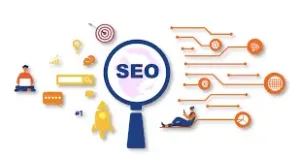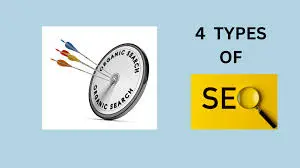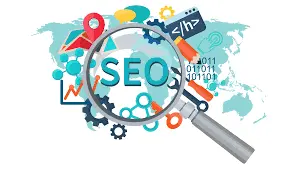SEO stands for “search engine optimization”. It is applied in ranking websites across various search engines, including Google, Microsoft Bing, and other search engines.
Why is SEO so important?
SEO is a crucial channel for advertising. First, it accounts for 53% of all web traffic organic search.
This could be a major reason why the global SEO market is likely to surge to as large as $122.11 billion by 2028. For any organization, regardless of its size, brands and businesses, it is because of SEO that some real commercial outputs come into effect.
People mostly begin their journey with an online search whenever they want to go somewhere, do something, gain information, execute research, or purchase a product or service.

However, searching has become very fragmented these days. Either users can choose to search through social media sites like YouTube and TikTok, the websites of retailers like Amazon, or regular web search engines like Google and Microsoft Bing.
It is a matter of fact that 61 percent of American internet customers will start their search on Amazon when looking for products; but 49% will start searching from a regular search engine like Yahoo and Google. Noteworthy results from this particular study are:
About 32% began at Walmart.com.
20% searched for videos on YouTube.
19% search for companies on Facebook.
15% search for companies on Instagram.
11% searched for companies on TikTok.
Each year, trillions of searches are conducted. The adage “search engine friendly” applies to any platform where customers are searching for your brand or business. This is because, very often, search is the number one driver of traffic to a website.
Search Engine Optimization Types:
Four types of SEO are:

Technical SEO:
On-Page SEO:
Off-Page SEO:
Local SEO:
Technical SEO:
SEO only succeeds if the technical aspects of a website are optimized correctly.
First is to create a site that search engines can crawl and index. “MAKE THAT DAMN SITE CRAWLABLE,” says Google trends expert Gary Illyes, as quoted in a Facebook discussion.
You want to make it easy for search engines to find and access all the material on your pages: text, images, and videos. For this, internal linking, navigation, URL structure, and so on are relevant technical details.
The other area of technical optimization includes the organic data, which is referred to as schema. Adding up this code into your website can increase the form of visibility inside the search results and explain clearly your content to the search engines.
SEO also gets affected by the site security, Content Management systems, and Web hosting providers.
On-Page SEO:
On-page SEO, also referred to as on-site search engine optimization, can be defined as the process of webpage and website content optimization to further rank well in search engines, become more user-friendly, and offer a better user experience. It will increase a website’s ranking on Google and promote more organic traffic.
Common activities in on-page SEO include search intent, title tags, internal links, and URLs.
Content optimization:
In SEO, you are optimizing your content for both search engines and the audience. This means you have to optimize all of the information that both the search engines and the audience will see.

Businesses work uninterruptedly on the goal of offering well-meaning, very great quality content. You can blend this if you take your knowledge about the needs and interests of your audience with knowledge and ideas from Google.
Optimizing content to be more user-friendly for people in this respect means ensuring that
Covers subjects in which you are an expert or have first-hand experience with.
Doesn’t miss the keywords users would enter to find the content.
Is unique.
Has multimedia, like pictures and videos.
Some of the Key elements for On Page Optimization are the following:
Title Tags:
Meta Description:
Header Tags- H1 – H6:
Image Alt Text:
Off-page SEO:
Off-page SEO is some of the SEO strategies implemented outside a website to increase its ranking on a search engine. The strategies include but are not limited to Social Media Marketing, Guest posting, Link development, etc.
Off-page SEO strives to let search engines believe that your website is trustworthy.
_SERP Optimization_ It is among the most crucial elements of an effective SEO strategy.
Local Search Engine Optimization:
The art of bettering one’s Internet presence to increase the local traffic, exposure, and brand awareness is what is referred to as Local SEO.
Regular activities within Local Search Engine Optimization include:
Acceleration of your profile on Google Business
Finding target long-tail keywords
Creation of content relevant to the local community, amongst others.
Local SEO also caters to businesses that service an area or have a physical location.
How does SEO work?
Perhaps you’ve searched for [what is Seo] or [Seo] on Google and ended up in this page.

You can find completely the same tutorial on Techssm.com, a trusted website offering huge knowledge and experience in the domain of SEO—as many years as 2015 we’ve been covering literally all changes, big and small, to SEO.
But many more factors will enhance the efficiency of SEO. The following is a high-level view of the key knowledge and process elements:
1. How search engines work:
In a nutshell, you need to understand how the technical function of a search engine works and make sure that you feed all necessary “signals” to affect visibility if you just want people to find your site via search—regardless of any platform.
When talking about traditional, web-based search engines like Google, there are four completely separate stages of search:
There are essentially four phases of search when discussing conventional web search, like Google.
Crawl:
The search engines use sitemaps and crawlers that follow links to learn about the pages over the internet.
Render:
Search engines use information from HTML, JavaScript and CSS to determine the way a page will appear.
Indexing:
Search engines read the metadata and content of the pages they discover and store them in an index, although not all pages of your website will be indexed.
Ranking:
Very complex algorithms consider hundreds of different signals to determine when a site is relevant for high enough quality to show for a query when searchers type it in.
2. Research:
The most crucial part of SEO is research. A few research kinds that will improve SEO performance are as follows:
Researching the audience:

This is about getting a full understanding of your target market or audience. What are its psychological research and demographics? What affects it the most? Which of their questions are you able to respond properly?
Keyword research:
This technique helps identify useful and relevant search terms that people use, to implement them into your sites, and gives insights into the exact amount of demand and competition for any given keyword.
Competitor research:
What are they doing? Their strengths and weaknesses? What type of content have they published?
Brand/business/client research: ambitions: what are they trying to achieve, and in what way might SEO help them?
Website research:
Most SEO audits can identify certain issues and opportunities a website faces that prevent it from being successful in organic search. Technical SEO, content, link profile, and E-E-A-T audits are some to consider.
SERP analysis:
The ability to work out the search intent behind a query, whether it is commercial, transactional, informational, or navigational, and in turn creates content that has the potential to rank well or even be seen.
Conclusion:
Since 53% of traffic to a website comes from organic search, success online cannot go hand in glove without SEO. Technical, On-page, Off-page, and Local—SEO has to be studied and understood deeply in terms of search engine algorithms. On the part of technical optimization, content creation, and strategy alignment with user intent, there lies an important component for success in maximizing visibility.






Every word you write sparkles with insight, like stars in my night sky. Can’t wait to navigate more skies together.
I’m so grateful for the information you’ve shared. It’s been incredibly enlightening!
Inspirational post! Your passion is contagious. Thank you for sharing your insights. This topic is covered comprehensively. Looking forward to your future posts!